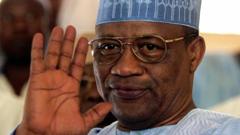In his newly released autobiography, former military ruler Ibrahim Babangida shares reflections on critical events during his tenure from 1985 to 1993, including the annulled 1993 elections and the execution of a close friend. While the book has reignited debates over his legacy—ranging from infrastructure development to corruption—Babangida’s candid admissions, particularly his regret for past actions, resonate deeply with Nigerians seeking to understand their historical trajectory.
Reflecting on History: Key Insights from Ibrahim Babangida's Autobiography

Reflecting on History: Key Insights from Ibrahim Babangida's Autobiography
Nigeria's former military ruler reveals controversial decisions and personal reflections in "A Journey In Service," provoking discussions about the country’s political past.
In "A Journey In Service," published recently, Nigeria's former military leader, Ibrahim Badamasi Babangida, widely known as IBB, opens up about his tumultuous regime that lasted from 1985 to 1993, eliciting a mixed bag of reactions among Nigerians. The autobiography not only chronicles the political climate of the time but also sheds light on the personal decisions that have defined Babangida’s legacy, notably the annulment of the 1993 elections and the execution of a childhood friend.
One of the most striking revelations from Babangida is his expression of regret regarding the annulled 1993 presidential elections, a turning point often attributed with redirecting Nigeria's political landscape. He admits that it was a grave mistake, stating, “That accident of history is most regrettable. The nation is entitled to expect my expression of regret.” The annulment triggered widespread unrest and protests, deeply embedding civil strife in the fabric of Nigerian politics. Many believe the ramifications of this decision are still felt today, with the date of the election, June 12, now commemorated as Democracy Day in Nigeria.
Amidst the political decisions, Dabangida reflects on the painful memory of his friend, General Mamman Vatsa, who was executed in 1986 after being implicated in a coup attempt. Babangida, who described their friendship and camaraderie, shares a conflicting emotion of guilt and responsibility, stating, “I had to choose between saving a friend's life and the nation's future.” His memories signify the personal toll corruption, ambition, and loyalty can take in a political arena fraught with danger.
The book also revisits Nigeria's first coup in 1966, often labeled as an "Igbo coup." Babangida challenges this narrative, highlighting the multifaceted ethnic involvement in the military takeover, which ultimately led to the devastating civil war, known as the Biafran war. He elucidates his view that the coup was motivated by a desire for political reform rather than ethnic rivalry. Nonetheless, the association of the coup with the Igbo tribe had long-lasting repercussions, igniting tensions that still reverberate today.
Babangida's portrayal of his late wife, Maryam, adds a deeply personal layer to the autobiography. He recalls their loving partnership, her influence as First Lady, and acknowledges the profound impact her death has had on his life. "Coping without her has not been easy, but it has been made much less demanding by the memories of our life together," he writes, painting a picture of a man shaped by love as much as by power.
With these poignant revelations, Babangida's autobiography not only invites criticism and reflection on his past governance but also provokes vital conversations about Nigeria's evolving identity and the shadows of its history.



















